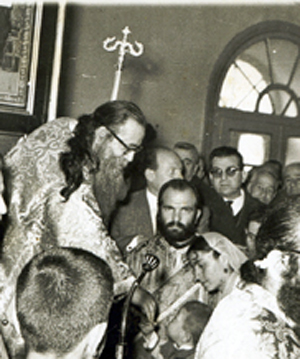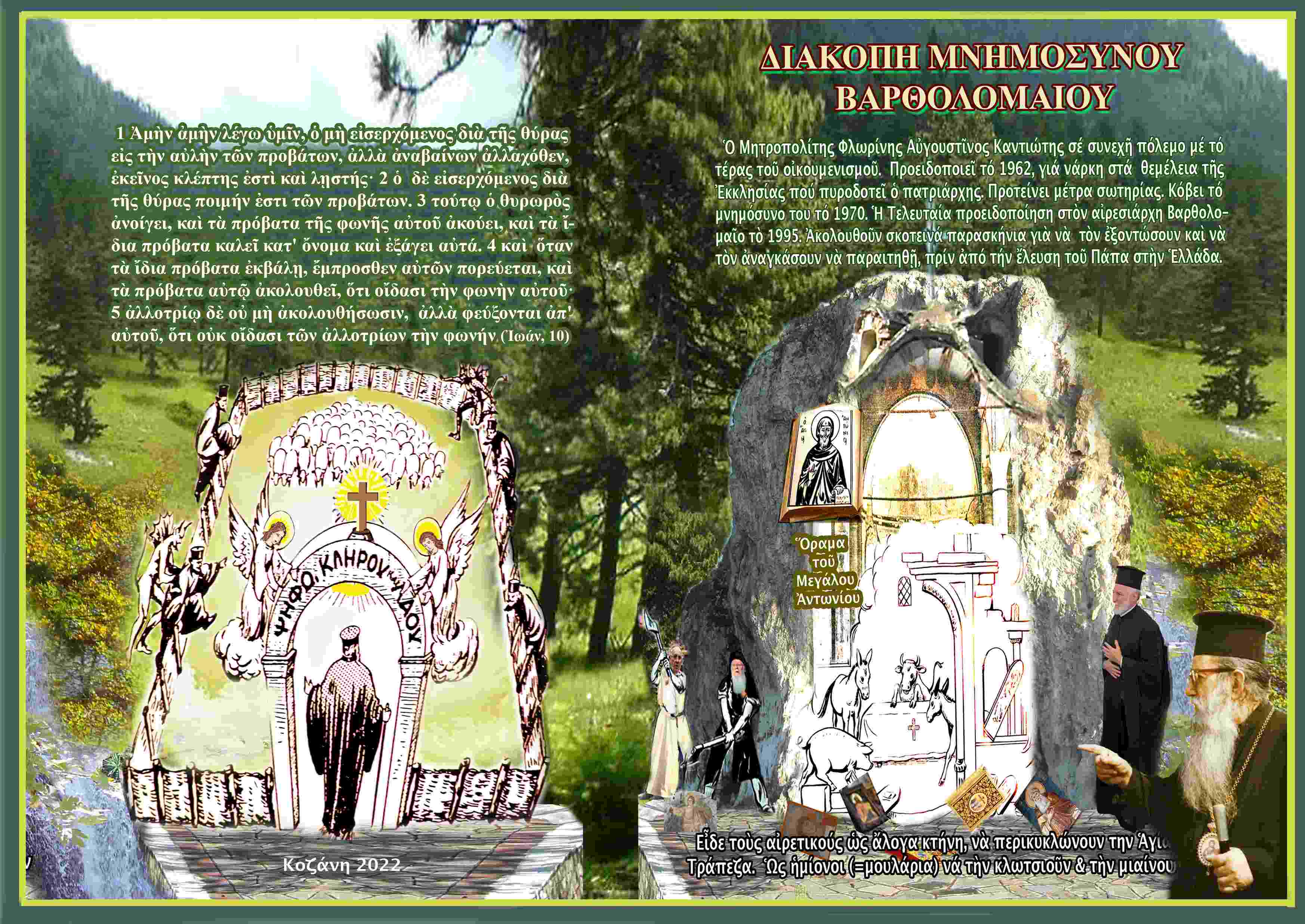THE NAMES
 Ιαν 13th, 2010 |
Ιαν 13th, 2010 |  Filed under: English
Filed under: English
Απόσπασμα από τό βιβλίο του πατρός Αυγουστίνου «Είς τήν Θείαν Λειτουργίαν, Πρακτικαι Ομιλίαι»!
TA ONOMATA (Ομιλία 6)
THE NAMES
“An in one Lord, Jesus Christ, the Son of God”
 Christian friends, there are twelve articles in the Symbol of Faith. One of them, the first, concerns God. The following six concern Christ. The Creed consists of 174 Greek words. Most of them, 100, speak about Christ. Why is this? Because Christ was disputed by many unbelievers and heretics.
Christian friends, there are twelve articles in the Symbol of Faith. One of them, the first, concerns God. The following six concern Christ. The Creed consists of 174 Greek words. Most of them, 100, speak about Christ. Why is this? Because Christ was disputed by many unbelievers and heretics.
As we said in our previous homily, unbelievers questioned even Christ’s historical existence, and heretics questioned and interpreted His life and acts in different ways, introducing theories which do not agree with Gospel teaching, and for this reason they were condemned by Ecumenical Synods.
From the day of Her conception, the Church held faith in Christ to be of great importance. Christ is the center, the Alpha and Omega, the beginning and the end. When a man asked the Apostles “What must I do to be saved?” they answered: “Believe in the Lord Jesus Christ” (Acts 16:31).
But, who is Christ? The Symbol of the Faith answers this question. My brief answer is rather comprehensive, with words having deep meaning and requiring some explanation and discussion. Let us explain the first words of the second article: “And in Lord, Jesus Christ, the Son of God”.
As you see, Christ has four names. The first name is LORD. The second is JESUS, the third, CHRIST, and the forth, SON OF GOD.
These names are not simply words which have no relation to reality, like words without substance. They are names that correspond to reality. For example, someone has the name Anargyros. To have content and correspond to reality, the man bearing this name should be free from the love of money, in the manner of the holy Unmercenaries (Anargyroi). If he is miserly and greedy, however, then he bears this name in vain. The names that the Holy Scripture give to Christ, however, do correspond to reality.
First, let us see what the name Lord means. Every man today is called by the title MISTER, which in most languages is the same word as LORD, and it’s considered rude not to call him MISTER. But the lordship of man called MISTEr, no matter how rich and powerful he is, is temporary and very limited, even if he holds command over many things. Today, rich, tomorrow poor. Famous today, tomorrow unknown and despised. Even if one owns many things and commands many people, this is not important. What is important is commanding one’s own self, to rule and subjugate one’s passion. If he lets his passions rule him, even though he is called LORD and SIR, he will in fact be a slave – a slave of passions and sin, a slave of satan. O man! You are but called Lord, but you have yet to truly become a LORD.
Man’s lordship is limited. Little, trivial is this lordship compared to God’s. God’s power and dominion is limitless, and no one can find words to describe it sufficiently. In the Old Testament, the Hebrews did not dare pronounce God’s name, but they used to say it by another symbolic word, Yahweh or Jehovah. And as appears in many passages, Yahweh or Jehovah was seen and appeared to many people, and He was Christ. St. Nektarios, Bishop of Pentapolis, wrote a book about this and recently, Nikolaos Sotiropoulos, a theologian, wrote a very important book with the title “Jesus-Yahweh” (Athens, 1975). Christ as proved in a number of passages from the Old and New Testaments, is the Hebrew Yahweh and the Greek Kyrios (Lord) – they are one and the same.
Christ is LORD in an absolute sense. His domain is all creation, and consists of angels and men. Everyone is a subject of His domain, and even though some are wayward and do not obey Him, a time will come when even they will kneel before Christ.
Christ is LORD. Open the Holy Scripture and read the seventh chapter of the prophet Samuel. There you will see that the prophet Samuel saw a vision. He saw all the powers falling down in worship before the son of man, the Christ. The power, which appeared as an external power, had no end. St. John the Evangelist in the last book of the New Testament, Revelation, also saw Christ in a vision. He saw Christ seated on a white horse and crowned with many crowns, holding a sword. He was dressed in bright red and was called “KING OF KINGS and LORD OF LORDS” (Rev. 19:16).
Christ is Lord with a capital L. His other name is JESUS. This is a Hebrew name which means savior. Many people who offered the world a great service have been named saviors, but the salvation they offered is insignificant in comparison to the salvation that Christ offers. The angel said to the Virgin Mary that the child born of her would save people from sin. And the stories of millions of people who repented and were saved justifies the name given to the Child of Bethlehem at the angel’s command. A lesser image of Jesus the Savior is a great man of the Old Testament, Joshua (Jesus son of Nun), a shadow of the great Savior.
The second Person of the Holy Trinity is also called by the name Christ. Those who believe in His Gospel have been called Christians, after this dear name. Why is Jesus called this? Because those Old Testament men who were destined to become kings of Israel were ‘christened’ so with holy oil. Jesus was ‘christened’ the king of the New Israel. He was ordained in the Jordan river as a man by the Holy Spirit and is now reigning over and governing His spiritual kingdom, the Church.
Christ the Messiah whom people were awaiting. He is the Teacher. His the High Priest and King of the Universe. To Him belongs all honor and glory forever.
Say, then, my Christian friend: “I believe… in one Lord Jesus Christ, the only-begotten Son of God.”
This chapter was taken from the book “ON THE DEVINE LITURGY – VOL.2” by Bishop Augoustinos N. Kantiotes.
e-mail: ibmgs3@verizon.net
http://www.ibmgs.org
http://www.ibmgs.org/chatechetic.html


Add A Comment
You must be logged in to post a comment.